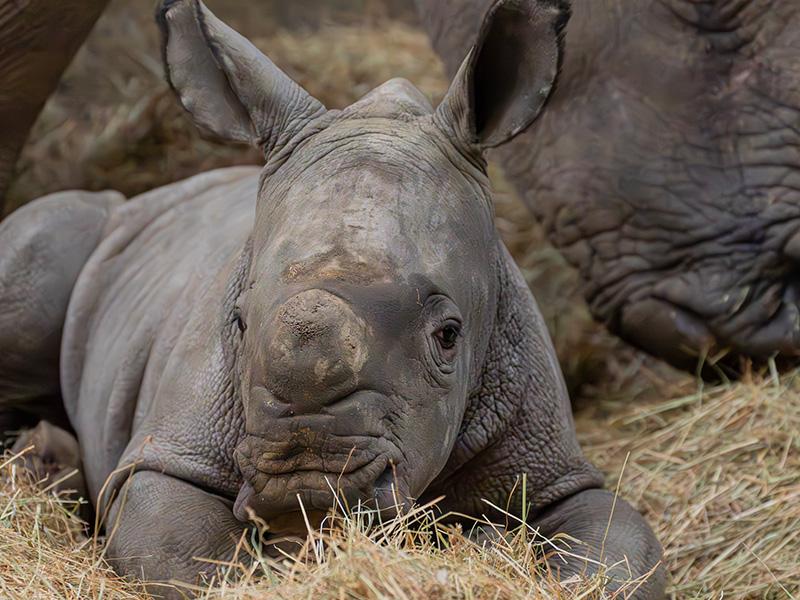Markus Joins the Crash – Cotswold Wildlife Park’s 12th Rhino Calf

Welcoming Markus to the “Crash” – Cotswold Wildlife Park Celebrates the Arrival of Its 12th Rhino Calf and the Only UK Birth in 2025
Markus is the newest addition to the Rhino family at Cotswold Wildlife Park & Gardens — the twelfth White Rhino calf to be born at the Burford collection in twelve years, and the only White Rhino birth in the UK in 2025. The youngster is healthy and nursing well from Nancy, an exceptional and attentive mother. This is her seventh calf with breeding male Monty.
It is rare to capture Rhino births on camera as females usually calve at night. Keepers were present the evening Markus was born; following a sixteen-month pregnancy, Nancy delivered a male calf in under 45 minutes. Mammal Keeper Liam Klingsick filmed the moment, while Head Keeper Mark Godwin — who has worked at the Park for 35 years and overseen the ‘crash’ for the last 12 — also witnessed the birth. Mark said: “He’s one of most confident calves I’ve seen. Newborns weigh approximately 70kgs at birth and put on roughly 1.5–2kgs a day in weight. If he grows into his features, he will be a big lad.”
Markus’s first venture outside into the Rhino paddock, filmed by Mammal Keeper Charlotte.
Females reproduce only every two to three years, so the window for successful breeding is limited. After a gestation period of sixteen to eighteen months, a single calf is born — one of the longest gestations of any land mammal, surpassed only by the elephant at twenty-two months. A newborn typically stands within an hour and attempts to suckle immediately, though may be unsteady for a few days. Calves usually suckle for around a year and remain with their mothers for at least two years, benefiting from close protection; females guard their offspring aggressively.
White Rhinos (Ceratotherium simum ssp. simum) have always been an important species at the Park, and names are chosen with care. The calf honours the late Dr Markus Borner, one of Africa’s most influential conservation scientists. Reggie Heyworth, Chairman of Cotswold Wildlife Park & Gardens, explains: “We have named our new arrival, Nancy’s 7th calf, Markus after the late Doctor Markus Borner. He gave me my break into conservation when he was head of Frankfurt Zoological Society in Tanzania… at the time there was a known population of only 12 Black Rhinos in northern Tanzania… maybe 50 in total in the whole country, from a population of 20,000 in 1970.”
Reggie adds: “By the time Markus died in 2020, Tanzania’s Serengeti ecosystem had substantially been re-populated with a potentially viable population of Black Rhinos… He was not only a giant of conservation but also my incredibly supportive boss and one of my best friends.” Dr Borner received numerous awards, including the 2016 Blue Planet Prize. Thanks are extended to Professor Sarah Cleaveland for kindly sharing his image.
This new arrival brings the present Rhino total at the Park to eight — the most ever on show at one time in the Park’s 55-year history — and among the largest family groups on display in the UK. Keepers believe they may also have captured the conception on camera, as Monty’s amorous display drew a crowd and lasted some time.
Markus is already delighting visitors with boisterous bursts of energy. Visitors can see the calf daily from 10am in the solar-powered Rhino House or the large Rhino paddock overlooking the Manor House. For days out and local updates, visit Explore Gloucestershire.
Explore Gloucestershire
31 October 2025
For further information.
OTHER NEWS
